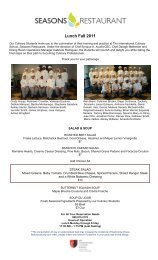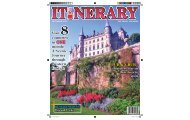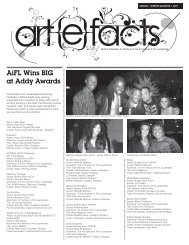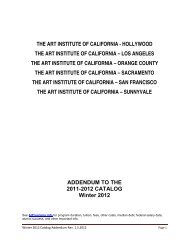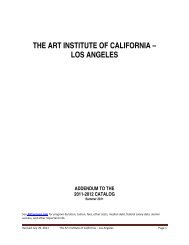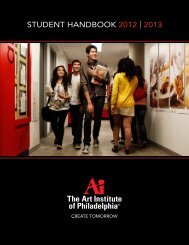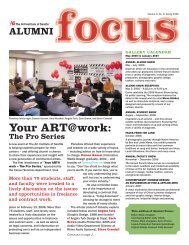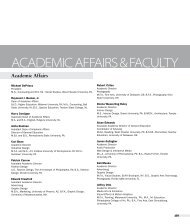2009 - 2010 Catalog - The Art Institutes
2009 - 2010 Catalog - The Art Institutes
2009 - 2010 Catalog - The Art Institutes
You also want an ePaper? Increase the reach of your titles
YUMPU automatically turns print PDFs into web optimized ePapers that Google loves.
students learn yeast-raised dough mixing methods,<br />
quick bread mixing methods, cookie dough,<br />
and product fi nishing techniques. Students must<br />
pass a practical exam. (Prerequisite: none) **This<br />
course requires a “C” or higher to pass. 4 Credits<br />
CU1432 - Introduction to Pastry:<br />
This course is a combination of theory, lecture,<br />
demonstration and hands-on production to<br />
provide an introduction to pastry techniques for<br />
use in a commercial kitchen. Students learn a<br />
variety of dough, batters, fi llings, and glazes with<br />
an emphasis on formulas. Instruction regarding<br />
the preparation of basic cakes and icings,<br />
roll-in dough, preparations of pastry cream<br />
and fi nishing techniques; plus selection, proper<br />
use and handling of various chocolates used in<br />
baking and decorating are introduced. Emphasis<br />
is also placed on dessert plating and presentation.<br />
Students must pass a practical exam.<br />
(Prerequisite: none) **This course requires a “C”<br />
or higher to pass. 4 Credits<br />
CU1471 - Sanitation and Introduction<br />
to Hospitality:<br />
This course is an introduction to the management<br />
perspective in the organization and structure<br />
of hotels, restaurants, and clubs. Students will<br />
also be exposed tot the importance of industry<br />
contacts and time management. <strong>The</strong> student will<br />
receive an overview of forces that shape the hospitality<br />
industry, tourism destinations, services<br />
affecting the industry, food service, management<br />
in the international market and a look at the future<br />
of food service. This course is also and introduction<br />
to food and the environmental sanitation<br />
and safety in a food production area. Attention is<br />
focused on food-borne illnesses and their origins,<br />
and on basic safety procedures followed in the<br />
food service industry. This course is approved<br />
by the Federal Food and Drug Administration<br />
(FDA) and is recognized by 95% of state and local<br />
jurisdictions that require training or certifi cation.<br />
Emphasis will be given to food service in all<br />
areas of the facility, maintenance, costs, fl ow, and<br />
production. (Prerequisite: none) 4 Credits<br />
CU1610 - Fundamentals of Classical<br />
Techniques:<br />
<strong>The</strong> fundamental concepts, skills, and techniques<br />
involved in basic cookery are covered<br />
in this course. Special emphasis is given to the<br />
study of ingredients, cooking theories, and the<br />
preparation of stocks, broths, glazes, and soups,<br />
thickening agents, the grand sauces, and emulsion<br />
sauces. Lectures and demonstrations teach<br />
organization skills in the kitchen, work coordination,<br />
and knife skills. <strong>The</strong> basics of vegetable<br />
cookery, starch cookery, meat, and poultry are<br />
covered. Emphasis is given to basic cooking<br />
techniques such as sauteing, roasting, poaching,<br />
braising and frying. Students must successfully<br />
56<br />
pas a practical cooking examination covering<br />
a variety of cooking techniques. (Prerequisite:<br />
none) **This course requires a “C” or higher to<br />
pass. 6 Credits<br />
CU1620 - American Cuisine:<br />
<strong>The</strong> course reinforces the students’ knowledge<br />
and skill learned in the preceding classes and<br />
helps build confi dence in the techniques of basic<br />
cookery. <strong>The</strong> development of knife skills is accented.<br />
American Regional cuisine explores the<br />
use of indigenous ingredients in the preparation<br />
of traditional and contemporary American<br />
specialties. <strong>The</strong> concepts of mise en place, time<br />
lines, plate presentation, and teamwork in a production<br />
setting are introduced and accentuated.<br />
Timing and organization skills are emphasized.<br />
(Prerequisites: CU1610 - Fundamentals of<br />
Classical Techniques and CU1471 - Sanitation and<br />
Introduction to Hospitality) 6 Credits<br />
CU2240 - Asian Cuisine:<br />
This course emphasizes both the infl uences and<br />
ingredients that create the unique character<br />
of selected Asian cuisines. Students prepare,<br />
taste, serve, and evaluate traditional, regional<br />
dishes of the cuisines of India, the four regions of<br />
China, Japan, Vietnam, Thailand, and Indonesia.<br />
Importance will be placed on ingredients, fl avor<br />
profi les, preparations, and techniques representative<br />
of these cuisines. (Prerequisite: none)<br />
2 Credits<br />
CU2250 - Contemporary Cuisine:<br />
This course will celebrate the culinary styles,<br />
restaurants, restaurateur and chefs who are in the<br />
current industry spotlight. <strong>The</strong>ir style, substance<br />
and quality will be discussed and examined.<br />
During the hands–on production aspect of the<br />
class, students will have the opportunity to be<br />
exposed to specialty produce and products.<br />
(Prerequisite: CU2640 - International and<br />
Classical Cuisine) 2 Credits<br />
CU2408 - Management and Supervision:<br />
This course focuses on managing people from the<br />
hospitality supervisor’s viewpoint. This emphasis<br />
is on techniques for increasing productivity<br />
and controlling labor costs, time management,<br />
and managing change. It also stresses effective<br />
communication and explains the responsibilities<br />
of a supervisor in the food service operation.<br />
How to motivate employees and resolve confl icts<br />
with staff, guests, and other departments are addressed.<br />
(Prerequisite: none) 4 Credits<br />
CU2409 - Management By Menu:<br />
This course prepares future food service managers<br />
by giving a clear picture of the important role<br />
menu planning plays within operations. It covers<br />
topics ranging from menu development, pricing,<br />
and evaluation to facilities design and layout.<br />
Students will benefi t because good menu development<br />
is crucial to the success of any foodservice<br />
operation. For example: a planning tool, source<br />
of operational information and as a merchandising<br />
method for reaching patrons. (Prerequisite:<br />
none) 4 Credits<br />
CU2441- Planning and Cost Control:<br />
This course is intended to provide the student<br />
with the methodologies and tools to control costs<br />
and help the student value the planning and control<br />
process in the food and beverage industry,<br />
Topics include: planning and controlling costs<br />
using budgeting techniques, standard costing,<br />
standardized recipes, performance measurements,<br />
food, beverage and labor cost controls<br />
and allocation of overhead. (Prerequisite: none)<br />
**This course requires a “C” or higher to pass.<br />
4 Credits<br />
CU2451 - Food and Beverage Operations:<br />
This class will provide an overview of the varied<br />
styles and outlets of food and beverage services<br />
that exist in the hospitality industry. <strong>The</strong> various<br />
skills necessary to effectively manage an operation<br />
are discussed, as well as the manager’s<br />
infl uence on staff and guest satisfaction. Various<br />
orders of service options will be covered, as well<br />
as the role of beverage operations in a full service<br />
facility. Menu and wine list design/costing will be<br />
examined, as well as staff training and scheduling.<br />
Responsible alcohol service certifi cation will<br />
be completed in this course. (Prerequisite: none)<br />
4 Credits<br />
CU2470 - Culinary Externship:<br />
This course has been designed to acquaint the<br />
student with actual working conditions in an approved<br />
restaurant/hospitality establishment. This<br />
course is a supervised entry-level work experience<br />
in the restaurant/hospitality fi eld requiring<br />
a minimum of 120 work hours. Individual conferences<br />
and class attendance is required. Students<br />
are responsible for securing an externship job<br />
and may seek assistance through the college.<br />
Students gain experience needed to enter their<br />
fi eld upon graduation. . (Prerequisite: Approval<br />
of Academic Director) 4 Credits<br />
CU2640 - International and Classical<br />
Cuisine:<br />
This course emphasizes both the infl uences and<br />
ingredients that create the unique character of<br />
selected International cuisines. Students prepare,<br />
taste, serve, and evaluate traditional, regional<br />
dishes of Europe, Africa, the Mediterranean,<br />
and Latin America. Importance will be placed<br />
on ingredients, fl avor profi les, preparations,<br />
and techniques representative of these cuisines.<br />
Through lectures, research, demonstrations and<br />
hands on cooking, students are introduced to the<br />
history, menu terminology, cooking techniques,



